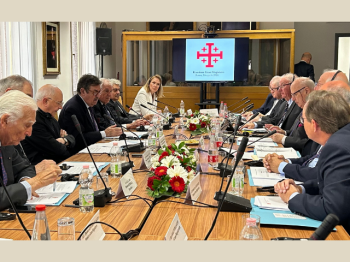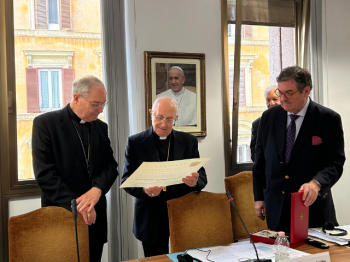The day began with Mass in the chapel of a religious community not far from the new offices of the Grand Magisterium, presided over by Archbishop Tommaso Caputo, Assessor of the Order, who had just celebrated his 50th anniversary of priestly ordination. In the morning, the Grand Master presented him with the insignia and diploma of Knight Grand Cross, in recognition of his commitment.
The meeting proceeded according to the agenda, after opening remarks by the Governor General, Ambassador Leonardo Visconti di Modrone, who explained the temporary move of the Grand Magisterium's premises by the work underway at the Palazzo della Rovere, part of which is being rented out to a hotel company so that all the Order's resources can be used to support Christians in the Holy Land. He also highlighted the increase in the obligatory monthly transfer made by the Grand Magisterium to the Latin Patriarchate for its institutional expenses, which now stands at 950,000 dollars as of January 2024.
The Treasurer, Saverio Petrillo, speaking after the Governor General, presented a positive balance sheet for the year 2023, indicating that the Order had been able to donate more than 15 million euros to the Holy Land, one million more than the previous year. The difficulty for the Grand Magisterium is that it has to make commitments to the Patriarchate in advance, without knowing exactly how much the Lieutenancies will be able to contribute, as donations from members vary each year depending on various factors.
The meeting continued with a speech by Sami El-Yousef, the General Administrator of the Latin Patriarchate, who described in all seriousness the crisis situation in the Holy Land: a destroyed economy and the despair of the inhabitants, many of whom are out of work due to the absence of pilgrims and tourists. What's more, Palestinian workers from the West Bank can no longer cross the border into Israel. The lack of communication between the Palestinian and Jewish communities is extreme, he explained, and it will take a long time to establish human links based on mutual respect. Sami El-Yousef pointed out that the main thing that can be done at present is to create jobs in the West Bank (a large number of people have been helped in this way since the start of the war, through the parishes, particularly in the field of construction, with jobs for bricklayers, electricians, tilers, etc.). The Patriarchate also covers the medical costs of a large number of uninsured patients and provides humanitarian aid to thousands of needy people. The school network (44 schools and almost 20,000 pupils), which encourages dialogue of life between young Christians and Muslims, continues to be active (the school budget corresponds to 76% of the Patriarchate's budget), except in Gaza, where there is the question of 80 contracts for employees until the end of the academic year, after the schools have been closed for good.
According to the Patriarchate's General Administrator, the reconstruction of Gaza (60% of the houses have been destroyed) will take a long time, and the Church's priority will be to provide psychological and humanitarian aid to the local parish, which has suffered heavy bereavement (32 people died, representing more than 3% of the Christian community).
During the meeting, Cardinal Filoni emphasized the urgent need to rebuild relationships based on trust, in order to move beyond the hatred that has taken root in people's hearts. The Church will have an increasingly essential role to play, he believes, in working towards coexistence based on respect for the inalienable rights of the different communities to live on the land of their ancestors.
The President of the Commission for the Holy Land, Bartholomew McGettrick, also agreed, recounting the visit made by the Commission last March and then stressing the importance of the Patriarchate's next strategic plan, expected next summer, in order to adapt the Order's efforts to the humanitarian and pastoral requirements outlined by Cardinal Pizzaballa. Each of the four Vice-Governors spoke during the meeting, highlighting, for example, the search for extraordinary funds to support the Latin Patriarchate, while the Grand Master recalled the need to safeguard in the long term the identity of the Order, which is statutorily based on the personal contribution of members, like that of the widow's obolus in the Gospel (Mk 12, 41- 44). The Vice-Governors also spoke of the importance of the long-awaited document on the formation of members and the future Regulations of the Order, which are about to come into force, as well as the development of the Order, especially in Latin America and Asia.
For his part, Chancellor Alfredo Bastianelli showed that in 2023 the Order have welcomed more than 1,000 new members, and hoped to return to its pre-pandemic level of nearly 30,000 members. He confirmed that the Regulations would soon be ready and sent ad experimuntum to the Lieutenancies, and then expressed his satisfaction at the number of registrations for the jubilee pilgrimage (over 4,000), which will take place from October 21 to 23, 2025.
Finally, the day ended with a discussion on internal and external communication, before the Grand Master concluded by focusing on the priority of the spiritual formation of members and knowledge of the Order - in particular through the creation of a permanent historical commission - as well as on welcoming young people, in a missionary perspective of growth and continuity in the service of the Mother Church of Jerusalem.
François Vayne
(April 2024)





